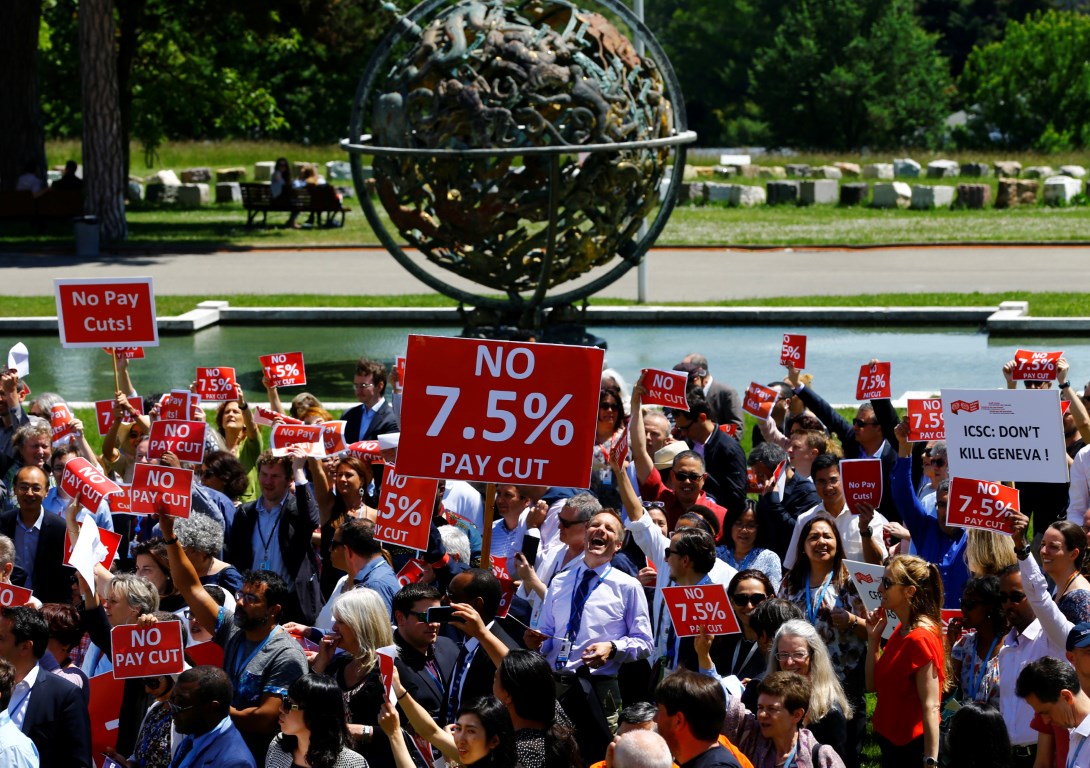UN Geneva staff protests pay cuts
March 16, 2018 | Expert Insights

The United Nations Human Rights Council and other important UN meetings in Geneva, Switzerland were cancelled on Friday after the staff voted for an unusual one-day strike to protest wage cuts and worsening work conditions.
Background
Of the four major office locations of the United Nations, the United Nations Office at Geneva (UNOG) is the second largest. It is located in the Palais des Nations building at Geneva, Switzerland and was established in 1945.
Aside from United Nations administration, the headquarters hosts offices for numerous programs and funds such as the United Nations Conference on Trade and Development (UNCTAD), the United Nations Office for the Coordination of Humanitarian Affairs (OCHA), and the United Nations Economic Commission for Europe (ECE). Specialized agencies of the UN and other UN bodies with offices in Geneva conduct periodic briefings at the Palais des Nations, organized by the United Nations Information Service at Geneva.
In February, several UN Geneva staff took part in a half-day strike. Since April 2017, its staff has progressively increased the number of protests against plans to cut annual salaries of international civil servants within the city. The staff has also conducted a wider UN protest for “more transparent, participatory, balanced and fair process to determine staff pay and conditions”.
Analysis
Disgruntled UN staff in Geneva have been protesting against a 7.5% cut to their salaries since May 2017, which is equivalent of almost one month’s pay. The pay cut was proposed by a group of independent experts, the International Civil Service Commission (ICSC). This involved reducing a “post adjustment index” for professional staff working in the city. The commission surveyed the cost of living in eight UN locations and concluded that the cut for staff based in Geneva would be aligned with that of New York, considering that purchasing power had fallen over the years.
Approximately 1,000 UN civil servants voted in favor of the one-day strike action, while 120 people opposed it. It is estimated that 9,500 employees work at the Geneva office or at UN agencies like the World Health Organization situated in the city.
Attempts were made by the head of the UN in Geneva, Michael Moller, to call off the strike. He emphasized that the UN "recognizes and respects your freedom of association." However, he noted that UN staff were "international civil servants bound by the Staff Regulations and Rules."
“The results of the vote are hugely positive and show your courage in saying a big NO to efforts by the ICSC and our employer to weaken our conditions of service, in an arbitrary manner. You also said NO to intimidatory emails from management,” said Ian Richards, head of the Staff Coordinating Council at UNOG.
Richards said an “intimidatory email from management against the strike had backfired and swayed those who were sitting on the fence in favour of the strike”.
The 37th Human Rights Council session in Geneva was cancelled, but no demonstration was planned. Nearly 100 heads of state, ministers and representatives of various countries were expected to attend the 37th session of the Human Rights Council as well as the meetings of the Conference on Disarmament. Work is set to be resumed on Monday, while parallel human rights meetings organized by states and non-governmental organizations have not been affected.
Assessment
Our assessment is that the increasing strike action by the UN staff over the past year shows the extent to which the employees have lost trust in the organization and their conditions of service, whether in Geneva or elsewhere. The protesters plan to escalate the situation if the meeting of the International Civil Service Commission, in New York next week, does not address the pay cut. Although UN employees are considered among the highest paid civil servants in the world, ICSC-mandated cuts could become painful in a city like Geneva, where costs are high. The UN can expect a similar movement by staff stationed in other countries if adequate measures are not taken.








Comments